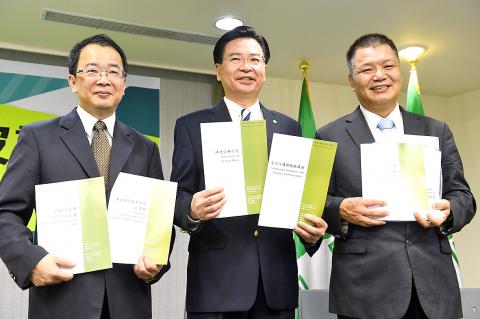The Democratic Progressive Party (DPP) released its defense policy paper yesterday, proposing to establish a cyberarmy as the fourth branch of the armed forces, along with focused investment and government support to develop the nation’s defense industry.
Other key recommendations in the 2015 Defense Policy Blue Paper include nurturing companies for the government’s indigenous submarine plan, merging the Veterans Affairs Council with the Ministry of National Defense and reassessing the all-volunteer military program.
DPP Secretary-General Joseph Wu (吳釗燮) said the nation needs to set up a cyberarmy to combat the daily “digital warfare” seen in cyberattacks from China.

Photo: George Tsorng, Taipei Times
The DPP’s Defense Policy Advisory Committee proposed establishing a cyberarmy by recruiting cybersecurity experts and young computer professionals, with an initial budget of NT$1 billion (US$32.56 million) and a “Cyberarmy Command Headquarters Office” that would integrate the functions and resources from the defense ministry’s “communications electronics and information,” “military intelligence and surveillance,” “digital warfare command” and “communications development” offices.
The party said the new branch would have commissioned officers and a command structure similar to the army’s, with active service obligations and benefits in line with the current branches.
Asked about the DPP’s proposal, defense ministry officials said the National Security Act (國家安全法) could be amended to enable existing units of the armed forces to defend the nation’s digital territory.
They also said that the military has in recent years adjusted its resources and recruiting to attract computing and electronic communications staff to enhance the nation’s overall cybersecurity, while the military employs cyberattack simulations during its digital warfare exercises.
Committee convener York Chen (陳文政) said the nation has the talent in science and engineering to obtain the technical know-how to advance toward the goal of a self-sufficient defense industry.
“An indigenous defense industry has a positive strategic impact on bolstering public confidence in, and support of, national defense,” the policy paper says.
DPP officials said Taiwan faces increasing difficulty in obtaining foreign arms because of China.
The policy paper says the government should seek international cooperation with its allies on new technologies so that it could eventually produce and maintain most of its weaponry and equipment.
It also says the defense ministry should encourage investment in the capacity for indigenous arms production.
“In the past, Taiwan’s defense ministry officials often headed to the US with shopping lists of weapons and military equipment to buy,” Wu said.
“That was the old approach. In the future, we will go to the US and tell them what our needs are and what are our weaknesses are. We will ask them to assist and upgrade our domestic defense sector in these areas,” he said.
The annual budget of the defense ministry should be stabilized at 3 percent of Taiwan’s GDP, Wu said.

CHAOS: Iranians took to the streets playing celebratory music after reports of Khamenei’s death on Saturday, while mourners also gathered in Tehran yesterday Iranian Supreme Leader Ayatollah Ali Khamenei was killed in a major attack on Iran launched by Israel and the US, throwing the future of the Islamic republic into doubt and raising the risk of regional instability. Iranian state television and the state-run IRNA news agency announced the 86-year-old’s death early yesterday. US President Donald Trump said it gave Iranians their “greatest chance” to “take back” their country. The announcements came after a joint US and Israeli aerial bombardment that targeted Iranian military and governmental sites. Trump said the “heavy and pinpoint bombing” would continue through the week or as long

TRUST: The KMT said it respected the US’ timing and considerations, and hoped it would continue to honor its commitments to helping Taiwan bolster its defenses and deterrence US President Donald Trump is delaying a multibillion-dollar arms sale to Taiwan to ensure his visit to Beijing is successful, a New York Times report said. The weapons sales package has stalled in the US Department of State, the report said, citing US officials it did not identify. The White House has told agencies not to push forward ahead of Trump’s meeting with Chinese President Xi Jinping (習近平), it said. The two last month held a phone call to discuss trade and geopolitical flashpoints ahead of the summit. Xi raised the Taiwan issue and urged the US to handle arms sales to

State-run CPC Corp, Taiwan (CPC, 台灣中油) yesterday said that it had confirmed on Saturday night with its liquefied natural gas (LNG) and crude oil suppliers that shipments are proceeding as scheduled and that domestic supplies remain unaffected. The CPC yesterday announced the gasoline and diesel prices will rise by NT$0.2 and NT$0.4 per liter, respectively, starting Monday, citing Middle East tensions and blizzards in the eastern United States. CPC also iterated it has been reducing the proportion of crude oil imports from the Middle East and diversifying its supply sources in the past few years in response to geopolitical risks, expanding

Pro-democracy media tycoon Jimmy Lai’s (黎智英) fraud conviction and prison sentence were yesterday overturned by a Hong Kong court, in a surprise legal decision that comes soon after Lai was jailed for 20 years on a separate national security charge. Judges Jeremy Poon (潘兆初), Anthea Pang (彭寶琴) and Derek Pang (彭偉昌) said in the judgement that they allowed the appeal from Lai, and another defendant in the case, to proceed, as a lower court judge had “erred.” “The Court of Appeal gave them leave to appeal against their conviction, allowed their appeals, quashed the convictions and set aside the sentences,” the judges